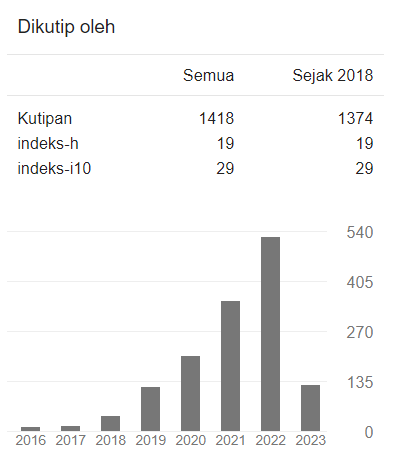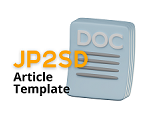Problem Based Learning: Upaya Strategis Peningkatan Hasil Belajar Siswa Kelas III Dalam Pembelajaran PKn Materi Kewajiban di Rumah
DOI:
https://doi.org/10.22219/jp2sd.v11i1.25308Keywords:
Pancasila Education, Problem Based Learning, Elementary School , Learning OutcomesAbstract
This study aims to determine the application of the Problem-Based Learning model in improving the learning outcomes of Pancasila Education on obligations at home in grade 3 This study aims to determine the application of the Problem-Based Learning model in improving the learning outcomes of Pancasila Education on obligations at home in grade 3 students at SDN Junrejo 2 Kota Batu in the 2022/2023 Academic Year. Based on the observations, it is known that students have not shown an increase in learning outcomes in the subject matter of obligations at home. The teacher has made efforts to use the lecture method and media around the student's environment. Therefore, we need a learning model that attracts students' attention through real problems in the surrounding environment. This study used data collection techniques in the form of test results, observations, and documentation carried out on 3B class students with 20 research subjects. This Research Problem-Based Learning model is applied to the Pancasila Education module with a time allocation of 4 x 35 minutes through 2 cycles. The results of the research on the application of the Problem-Based Learning model show that there was a positive response by students in learning activities of 91.67% with the achievement of the implementation of the Problem-Based Learning model by the teacher of 97.20% while the learning outcomes of class 3 students experienced an increase in classical achievement by 40% in cycle I and 80% in cycle II. In addition, the Problem-Based Learning model also provides students with the ability to find knowledge.
Downloads
References
Ahyar, & Soepriyanto, S. (2019). Implementasi Model Pembelajaran Problem Based Learning ( PBL ) pada Mata Pelajaran Pendidikan Pancasila dan Kewarganegaraan ( PPKn ). JINOTEP (Jurnal Inovasi Teknologi Pembelajaran), 5(5), 74–80.
Annur, C. M. (2021). 88,99% Anak 5 Tahun ke Atas Mengakses Internet untuk Media Sosial. Badan Pusat Statistik. https://databoks.katadata.co.id/datapublish/2021/11/24/bps-8899-anak-5-tahun-ke-atas-mengakses-internet-untuk-media-sosial
Dewi, R. R., Suresman, E., & Suabuana, C. (2021). Pendidikan Kewarganegaraan Sebagai Pendidikan Karakter di Persekolahan. ASANKA: Journal of Social Science And Education, 2(1), 71–84. https://doi.org/10.21154/asanka.v2i1.2465
Dr. Usman, M. A. (2021). Ragam Strategi Pembelajaran Berbasis Teknologi Informasi (M. A. Dr. Syamsidar (ed.)). IAIN Parepare Nusantara Press.
Fadhilah, N., & Adela, D. (2020). Penguatan Nilai-Nilai Pancasila di Sekolah Dasar. Jurnal BELAINDIKA (Pembelajaran Dan Inovasi Pendidikan), 2(3), 7–16. https://doi.org/10.52005/belaindika.v2i3.44
Faiz, A., & Kurniawaty, I. (2023). Tantangan Penggunaan ChatGPT dalam Pendidikan Ditinjau dari Sudut Pandang Moral. Edukatif: Jurnal Ilmu Pendidikan, 5(1), 456–463. https://doi.org/10.31004/edukatif.v5i1.4779
Gusriyenti, M. P., & Reinita. (2020). Peningkatan Hasil Belajar Siswa dalam Pembelajaran Pkn Ddengan Model Problem Based Learning (PBL). Jurnal Inovasi Pembelajaran SD, 8(C), 14.
Hermansyah. (2020). Problem Based Learning in Indonesian Learning. Social, Humanities, and Educations Studies (SHEs): Conference Series, 3(3), 2257–2262. https://jurnal.uns.ac.id/shes
Hotimah, H. (2020). Penerapan Metode Pembelajaran Problem Based Learning Dalam Meningkatkan Kemampuan Bercerita Pada Siswa Sekolah Dasar. Jurnal Edukasi, 7(3), 5. https://doi.org/10.19184/jukasi.v7i3.21599
Jalaludin. (2021). Penelitian Tindakan Kelas (prinsip dan praktik instrumen pengumpulan data) (N. I. Budiatmawati (ed.); 1st ed.). Pustaka Media Guru.
Karlina, D. A., Aeni, A. N., & Syahid, A. A. (2020). Mengenal Dampak Positif dan Negatif Internet untuk Anak pada Orang Tua. Jurnal Pasca Dharma Pengabdian Masyarakat, 1(2), 53–56. https://ejournal.upi.edu/index.php/JPDPM/article/view/24002
Kartini, D., & Dewi, D. A. (2020). Implementasi Pancasila dalam Pendidikan Sekolah Dasar. Journal of Education, Psychology and Counseling, 3(1), 113–118.
Salinan Keputusan Kepala Badan Standar, Kurikulum, dan Asesmen Pendidikan, Kementerian Pendidikan, Kebudayaan, Riset, dan Teknologi Nomor 008/H/KR/2022 Tentang Capaian Pembelajaran Pada Pendidikan Anak Usia Dini Jenjang Pendidikan Dasar dan Jenjang Pendid, Pub. L. No. 008/H/KR/2022, Kemendikbudristek BSKAP RI 1 (2022).
Khotimah, A. H., Kuswandi, D., & Sulthoni. (2019). Pengaruh Model Problem Based Learning Terhadap Hasil Belajar PKN Siswa. JKTP Jurnal Kajian Teknologi Pendidikan, 2(2), 158–165.
Lee, H. C., & Blanchard, M. R. (2019). Why teach with PBL? Motivational factors underlying middle and high school teachers’ use of problem-based learning. Interdisciplinary Journal of Problem-Based Learning, 13(1). https://doi.org/10.7771/1541-5015.1719
Malay, N. M. (2022). Dampak Positif Dan Negatif Penggunaan Internet Pada Kalangan Mahasiswa Kelas a, B, C, Dan D Angkatan 2021 Prodi Pend. Bahasa Dan Sastra Indonesia, Universitas Nusa Cendana. Jurnal Lazuardi, 5(1), 70–88. https://doi.org/10.53441/jl.vol5.iss1.72
Martin, D. A., & Jamieson-Proctor, R. (2022). Pre-service Teachers’ Perceptions of Problem-based Learning for Developing Their Mathematics Teaching Pedagogy. IJPBL, 16(1).
Maryati, I. (2018). Penerapan Model Pembelajaran Berbasis Masalah Pada Materi Pola Bilangan Di Kelas Vii Sekolah Menengah Pertama. Mosharafa: Jurnal Pendidikan Matematika, 7(1), 63–74. https://doi.org/10.31980/mosharafa.v7i1.342
Musfah, D. J. (2018). Analisis Kebijakan Pemerintah Mengurai Krisis dan Karakter Bangsa (D. Munandar (ed.); 1st ed.). Kencana.
Nelvianti, & Fitria Yanti. (2020). Karakteristik Model Problem Based Learning Berbantuan E-learning Portal Rumah Belajar pada Pembelajaran IPA Tematik. Pedagogia Jurnal Ilmu Pendidikan, 18(02), 162–172. http://ejournal.upi.edu/index.php/pedagogia
Novelni, D., & Sukma, E. (2021). Analisis Langkah-Langkah model Problem Based Learning dalam Analisis Langkah-Langkah Model Problem Based Learning Dalam Pembelajaran Tematik Terpadu Di Sekolah Dasar Menurut Pandangan Para Ahli. Journal of Basic Education Studies, 4(1), 3869–3888.
Nurcahya, A., & Hadijah, H. S. (2020). Pemberian penguatan ( reinforcement ) dan kreatifitas mengajar guru sebagai determinan motivasi belajar siswa ( reinforcement and teacher creativity as determinant of student. JURNAL PENDIDIKAN MANAJEMEN PERKANTORAN, 5(1), 83–96. https://doi.org/10.17509/jpm.v4i2.18008
Odell, M. R. L., Kennedy, T. J., & Stocks, E. (2019). The Impact of PBL as a STEM School Reform Model The Interdisciplinary Journal of Problem-based Learning. Interdisciplinary Journal of Problem-Based Learning, 13(2). https://docs.lib.purdue.edu/cgi/viewcontent.cgi?article=1846&context=ijpbl
Omeri, N. (2015). Pentingnya Pendidikan Karakter Dalam Dunia Pendidikan. Manajer Pendidikan, 9(manager pendidikan), 464–468.
Partnership for 21 st Century Skills. (2015). Partnership for 21St Century Skills-Core Content Integration. Ohio Department of Education, 1–70. www.P21.org.
Putri, A. V., Naufal, A. P., Aisya, S., Hajron, K. H., & Suryawan, A. (2022). Prosiding Konferensi Ilmiah Dasar Peningkatan Hasil Belajar PKn Melalui Model Problem Based Learning (PBL) Pada Siswa SD Negeri 2 Gandulan. Prosiding Konferensi Ilmiah Dasar, 3, 1601–1609. http://prosiding.unipma.ac.id/index.php/KID
Rahardiyan, E. (2013). Pemanfaatan Internet Dan Dampaknya Pada Pelajar Sekolah Menengah Atas Di Surabaya. UNAIR REPOSITORY. http://journal.unair.ac.id/download-fullpapers-ln5ba2011865full.pdf
Ratnasari, A. D., Wahyudi, & Permana, I. (2022). Penerapan Model Pembelajaran Problem Based Learning Untuk Meningkatkan Hasil Belajar Siswa Pada Pembelajaran Tematik. Jurnal Pendidikan Dan Kebudayaan, 12(3), 261–266. https://doi.org/10.26858/jptp.v8i2.30287
Rohani, Maman, & Sulha. (2019). Pengaruh Pemberian Penguatan Oleh Guru Terhadap Hasil Belajar Siswa Dalam Pembelajaran Pendidikan Kewarganegaraan. Jurnal Pendidikan Kewarganegaraan, 3(20), 184–195.
Setia, T., Safita, R., & Gusfarenie, D. (2022). Penggunaan Media Video Berpengaruh Terhadap Aktivitas Belajar Biologi Siswa Madrsah Aliyah Pamenang Barat. EDU-BIO Jurnal Pendidikan Biologi, 6(2), 51–59.
Setiawan, A., & Khairiy, U. (2023). Penggunaan ChatGPT Untuk Pendidikan di Era Education 4.0: Usulan Inovasi Meningkatkan Keterampilan Menulis Adi Setiawan 1 , Ulfah Khairiyah Luthfiyani 2. 04(01), 49–58.
Syamsidah, & Suryani, H. (2018). Buku Model Problem Based Learning ( PBL ) (1st ed.). DEEPUBLISH (Grup Penerbitan CV BUDI UTAMA).
Wijayanti, A. (2019). Pengaruh Media Video Pembelajaran Terhadap Hasil Belajar IPA ditinjau dari Keaktifan Siswa. SOSIOHUMANIORA, 3(2), 153–160. https://doi.org/10.30738/sosio.v3i2.1614
Winarno, M. E. (2013). Buku Metodologi Penelitian. In Nanik (Ed.), Universitas Negeri Malang (UM Press) (2nd ed., Issue November). UM PRESS.
Yulianti, E., & Gunawan, I. (2019). Model Pembelajaran Problem Based Learning (PBL): Efeknya Terhadap Pemahaman Konsep dan Berpikir Kritis. Indonesian Journal of Science and Mathematics Education, 2(3), 399–408. https://doi.org/10.24042/ijsme.v2i3.4366
Downloads
Published
Issue
Section
License
Copyright (c) 2023 Mohammad Ilham Saputro

This work is licensed under a Creative Commons Attribution-ShareAlike 4.0 International License.
Authors who publish with Jurnal Pemikiran dan Pengembangan Sekolah Dasar (JP2SD) agree to the following terms:
- For all articles published in Jurnal Pemikiran dan Pengembangan Sekolah Dasar (JP2SD), copyright is retained by the authors. Authors give permission to the publisher to announce the work with conditions. When the manuscript is accepted for publication, the authors agree to automatic transfer of the publishing right to the publisher.
- Authors retain copyright and grant the journal right of first publication with the work simultaneously licensed under a Creative Commons Attribution-ShareAlike 4.0 International License that allows others to share the work with an acknowledgment of the work's authorship and initial publication in this journal.
- Authors are able to enter into separate, additional contractual arrangements for the non-exclusive distribution of the journal's published version of the work (e.g., post it to an institutional repository or publish it in a book), with an acknowledgment of its initial publication in this journal.
- Authors are permitted and encouraged to post their work online (e.g., in institutional repositories or on their website) prior to and during the submission process, as it can lead to productive exchanges, as well as earlier and greater citation of published work (See The Effect of Open Access).

This work is licensed under a Creative Commons Attribution-ShareAlike 4.0 International License.


















